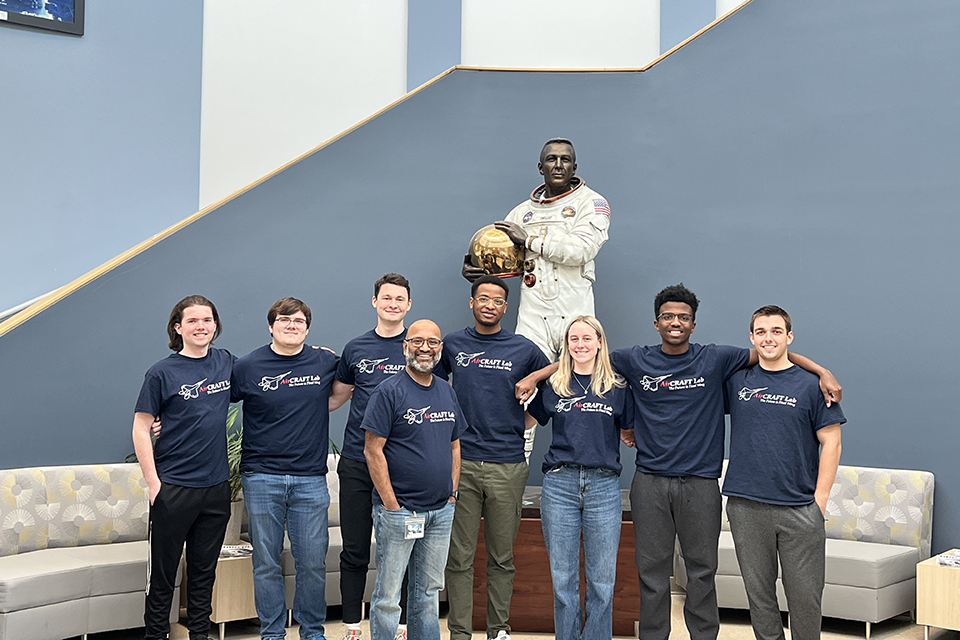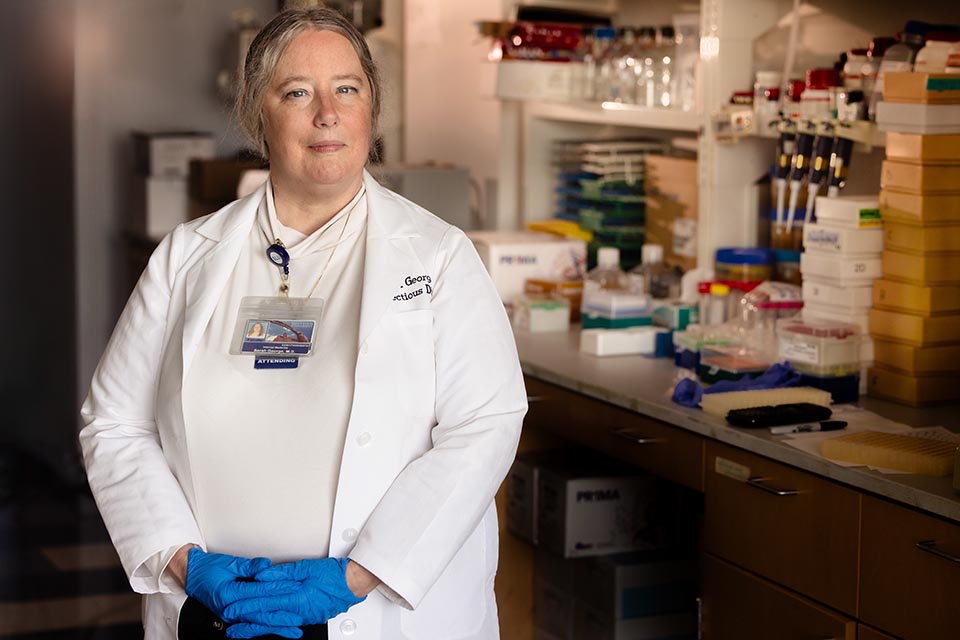AirCRAFT Lab Students at Saint Louis University Build Emergency Response Flyer
ST. LOUIS – Students in Saint Louis University’s Aircraft Computational and Resource Aware Fault Tolerance (AirCRAFT) Lab are building an emergency response flyer to improve disaster response. The innovative aircraft will be able to drop a person and supplies into areas hard hit by natural disasters or other humanitarian crises.
A grant from GoAERO, with support from NASA’s University Innovation project, funded the challenge.
Chuka Okeke, pictured at left, and Ian Roudebush, center, work with Will Jameson in the AirCRAFT Lab. Photo by Sarah Conroy.
Students work in the AirCRAFT Lab. Photo by Sarah Conroy.
From left, Will Jameson, Chuka Okeke, and Ian Roudebush in the AirCRAFT Lab. Photo by Sarah Conroy.
Srikanth Gururajan, Ph.D, right, and Nathan Mercier work in the AirCRAFT Lab. Photo by Sarah Conroy.
Will Jameson works in the AirCRAFT Lab. Photo by Sarah Conroy.
Chuka Okeke and Ian Roudebush in the AirCRAFT Lab. Photo by Sarah Conroy.
Mia Arndt, left, and Nathan Mercier work in the AirCRAFT Lab. Photo by Sarah Conroy.
Nathan Mercier, Will Jameson and Mia Arndt in the AirCRAFT Lab. Photo by Sarah Conroy.
Srikanth Gururajan, Ph.D, right, works with students in the AirCRAFT Lab. Photo by Sarah Conroy.
Will Jameson works in the AirCRAFT Lab. Photo by Sarah Conroy.
From left, Will Jameson, Chuka Okeke, and Ian Roudebush in the AirCRAFT Lab. Photo by Sarah Conroy.
Chuka Okeke and Will Jameson work in the AirCRAFT Lab. Photo by Sarah Conroy.
Ian Roudebush works in the AirCRAFT Lab. Photo by Sarah Conroy.
The GoAERO Prize challenges engineers worldwide to create portable, versatile, and autonomy-enabled Emergency Response Flyers that address not only everyday medical emergencies but also the worsening state of natural disasters, humanitarian emergencies and climate crises worldwide. Flyers must be capable of delivering a first responder, evacuating victims in need, providing emergency medical supplies, and aiding in humanitarian efforts.
The AirCRAFT Lab team consists of seniors majoring in aerospace engineering in SLU’s School of Science and Engineering. SLU is one of 14 university teams who won Stage 1, along with 11 other non-university teams. More than 150 teams from around the globe are competing for the prize.
“We are building something that will be able to deliver aid to people in a post-disaster situation,” said Srikanth Gururajan, Ph.D., associate professor of aerospace engineering and faculty leader of the AirCRAFT Lab. “This will allow faster triage in situations where it is harder to get larger vehicles in and out.”
SLU’s single passenger flyer is designed as a fully autonomous drone that could also be operated by an on-the-ground pilot using Virtual Reality.
“You can think of it like an air taxi – the person in the flyer doesn’t have to pilot it,” said AirCRAFT lab member Mia Arndt. “They can get in and go.”
The flyer will be able to drop needed supplies and transport a first responder right where they need to be, in locations where larger vehicles may not be able to traverse.
The team, which also includes Ian Roudebush, Zach Conti, Chuka Okeke, Will Jameson, Nate Mercier, and JP Lacroix, started thinking about the project late last year and began working on it in earnest when the school year began in August. They completed a design report in December and were awarded NASA’s University Innovation Project Stage 1 prize in February.
“The lab has been building planes for years,” Arndt said. “We started there with what we knew, and from there it was trial and error to get it to conform to the regulations. We didn’t have to start from scratch; we have all been working in the AirCRAFT Lab and could build off our prior knowledge.”
The first prototype is one-third of the size of the full-scale model. It is six feet long and is built to carry approximately six lbs of payload. The team is working together to build the model, with each contributing in different ways. Roudebush, Okeke and Lacroix led the manufacturing process of the fuselage, while Arndt and Mercier led the fabrication of the wings and tail sections, and Lacroix was additionally in charge of the engine and propulsion systems.
Initial practice flights are planned to be conducted over the summer and the approximate six pounds of payload is expected to include some boxes of Girl Scout cookies.
Conti said one of the team’s biggest challenges was flight control and making sure that the plane could maneuver through potential obstacles to get to a safe landing spot.
“We’ve done VR models before,” Conti said. “This had its own unique requirements, and we needed to refine what we knew.”
The team credited their easy working relationship to their years of working together as students in the School of Science and Engineering.
“This wasn’t a shot in the dark,” Conti said. “We knew we could do it.”
Roudebush added, “We work together – when one of us succeeds, we all succeed.”
The team will compete in a fly-off in September. At that time, as many as eight teams will be awarded additional prize money based on their prototypes. After that, the competition will enter a qualifying period, requiring an aircraft that has demonstrated controlled flight capability with a full payload. The final GoAERO Fly-Off event in February 2027 will feature three separate missions testing specific skills and capabilities relevant to public good missions, when an additional $1 million will be awarded to winning teams.

The 2024-25 AirCRAFT Lab team includes, from left, JP Lacroix, Will Jameson, Ian Roudebush, Srikanth Gururajan, Ph.D., Chuka Okeke, Mia Arndt, Zach Conti and Nate Mercier. Submitted photo.
About GoAERO
GoAERO was founded to create transformative flight technologies that save lives. Our mission is both to originate innovative aerial solutions that respond to challenges posed by natural disasters, medical emergencies, climate change, and humanitarian crises---and to create a collaborative network across industry, government, and aviation and first responder organizations to ensure the safe and effective future deployment of these life-saving aircraft.
In 2024, GoAERO launched the GoAERO Prize, which is a global competition committed to inspiring the creation of Emergency Response Flyers that rescue people in danger and respond to disaster wherever it is found. With more than $2 million in prizes, the competition will create safe, portable, robust, autonomy-enabled flyers. Teams competing in the GoAERO Prize will compete over a three-year period and benefit from expert mentorship, global exposure, access to software, products and services, and monetary prizes.
About Saint Louis University
Founded in 1818, Saint Louis University is one of the nation’s oldest and most prestigious Catholic research institutions. Rooted in Jesuit values and its pioneering history as the first university west of the Mississippi River, SLU offers more than 15,300 students a rigorous, transformative education that challenges and prepares them to make the world a better place. As a nationally recognized leader in research and innovation, SLU is an R1 research university, advancing groundbreaking, life-changing discoveries that promote the greater good.
Latest Newslink
- SLU Launches William L. Clay, Sr. Institute of Civic Engagement and Economic JusticeThe Clay Institute will provide immersive learning experiences and hands-on training that address the social and economic challenges facing the St. Louis region and the nation. Institute programming will be available to all students with an interest in civic engagement and democratic participation.
- SLU Research Explores Depression's Ripple Effect on DiabetesA study conducted by researchers at Saint Louis University found that patients with depression were more likely to have uncontrolled diabetes over time and that depression contributes to a heightened economic burden to diabetes management.
- SLU/YouGov Poll: Statewide Cell Phone Ban for Missouri Schools Popular with VotersGovernor Mike Kehoe has signed Senate Bill 68 into law, enacting a statewide ban on the use of personal electronic devices, including cell phones, tablets, and smartwatches, throughout the school day in Missouri public and public charter schools.
- SLU Vaccine Center Will Enroll Healthy Volunteers in Yellow Fever Vaccine Clinical TrialSaint Louis University's Center for Vaccine Development will enroll up to 70 adult volunteers in a clinical trial to study the safety elicited by a new investigational vaccine for yellow fever, a potentially deadly disease that is spread by mosquitoes. The research is funded by Sanofi Pasteur.
- Feser Joins Global Jesuit Assembly During First Week as SLU's PresidentAs he began his tenure as Saint Louis University's 34th president, Edward Feser, Ph.D., represented SLU as a delegate at the 2025 Assembly of the International Association of Jesuit Universities (IAJU).
- SLU Partnership with St. Louis Catholic Academy Middle School Education Yields Improved Outcomes One Year OnA partnership between Saint Louis University's School of Education's Herrmann Center for Innovative Catholic Education and St. Louis Catholic Academy has yielded improved test scores and student outcomes in the middle school population after its first year. The SLU School of Education provides resources to St. Louis Catholic Academy's middle school.













